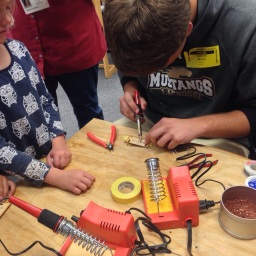In the past few weeks, I’ve watched children, adolescents, and teens demonstrate what agency means. It’s a function of both informal and formal settings being available to learners. It’s implementation and impact. It’s face to face and virtual.
It takes my breath away to watch learners’ agency catch fire and spread. Agency is an action word.
Agency doesn’t emanate from standardization of curricula or pedagogy. It’s not easily captured in assessment – rubrics or otherwise. But it’s easily seen, heard, and felt in young people who have it.
When we hear student voices at work and play in learning spaces, we know we’ve found educators who foster learning agency. They don’t seek to command it. They recognize agency comes from within learners who feel they have power to direct their own learning. Such educators value and exercise the inherent agency within themselves as they come to understand they can facilitate it in others. They give up teaching control to gain learning agency. Educators with agency support learners to generate their own questions and search for their own answers. They open doors for learners to move out of the classroom and explore a bigger world beyond the places we call school. They create a narrative in which learners’ ownership of learning resonates within the teacher-learner relationship.
They encourage learners to challenge ideas, question the authority and credibility of sources, build diverse but thoughtful perspectives, and design, make and improve as they connect with the world to communicate, share, and influence within the global network.
Educators who cultivate agency among young people want self-determined, active learners who don’t lose their voices in a school environment with passive, compliance-driven achievement in mind. They want young people who seek to discover what makes the world tick and who are driven by curiosity to know, understand and do whether age 5 or 18.
They want learners to grow up and take a sense of agency with them into their careers, communities and families. They want learners who see themselves as capable of influencing their own lives and the lives of others for the good of self and others. What more important learning outcome could we desire?








Thank you for this testament. I wonder how many schools hold themselves accountable for growing their students’ sense of agency? That is a learning outcome I could fully get behind and celebrate.
Once again you hit the nail on the head: teachers have to have the courage — and for most of us it takes courage — to cede control so that the students can develop it and express the agency within them. It is a hard thing to do, but very much worth it